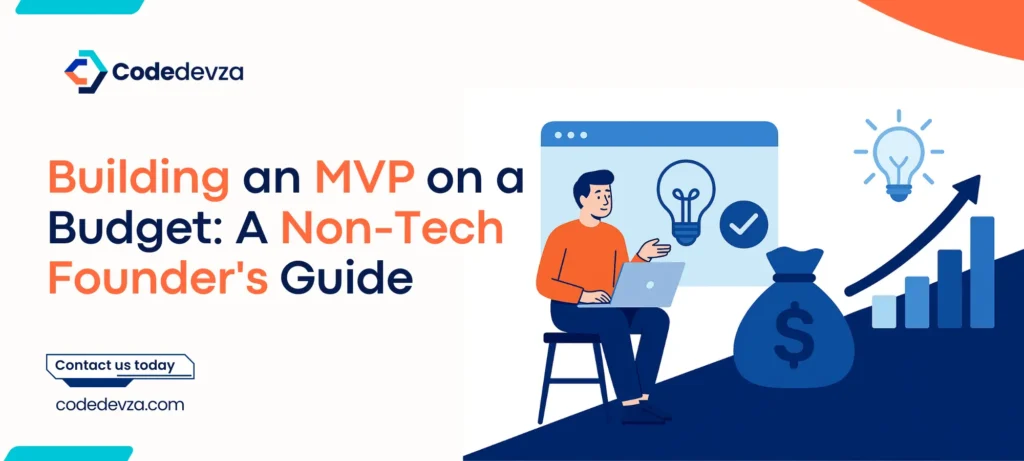So, you have a startup idea — but you’re not a developer. And your budget? Pretty tight.
Don’t worry — you’re not alone. Some of today’s most successful founders started without technical skills or deep pockets. What they did have was clarity, hustle, and the right team backing them.
At Codedevza, we specialize in helping non-technical founders bring their vision to life with MVP Development, strategic Tech Partnerships, and AI-Powered Solutions that make launching your startup lean and affordable.
In this guide, we’ll show you exactly how to build your MVP on a budget — without writing code or burning cash.
What Is an MVP (Minimum Viable Product)?
An MVP is the simplest version of your product that solves the core problem for your users. It’s designed to:
- Validate your idea
- Attract early adopters
- Collect feedback
- Avoid building features nobody wants
Think of it as your product’s first draft, not the final masterpiece. Your goal isn’t perfection — it’s learning.
Why Non-Tech Founders Can Still Win
Being non-technical doesn’t mean you’re unqualified. In fact, your role as a founder is to:
- Understand your users
- Define the problem clearly
- Design the vision
- Communicate it to the right team
With the rise of no-code tools, AI assistants, and startup-focused dev partners like Codedevza, building your MVP is more accessible than ever.
Step-by-Step: Building an MVP on a Budget
Step 1: Validate the Problem (Before You Build)
Before writing a single line of code, talk to your potential users. Ask:
- What are you struggling with?
- How are you currently solving this?
- What would the ideal solution look like?
You can use:
- Google Forms
- Typeform
- Reddit, Discord, or Facebook groups
Document recurring problems — they’re your opportunity.
Step 2: Define Your MVP’s Core Function
Strip your idea down to one primary job your product must do. Ask:
“What is the smallest version of this product that still solves the user’s problem?”
Avoid feature creep
Focus on the must-have, not the nice-to-have
This clarity will save you thousands in dev costs.
Step 3: Sketch the User Flow
Even without design skills, you can outline your product with:
- Pen and paper
- Miro or Figma (with templates)
- Notion or Whimsical
Highlight:
- How a user lands on your product
- What they do first
- What success looks like (the outcome)
This acts as your blueprint when working with an MVP team like Codedevza.
Step 4: Choose the Right Build Approach
Depending on your budget and complexity, you can:
Use No-Code Tools:
- Bubble, Glide, Thunkable — for web/mobile apps
- Webflow, Carrd — for landing pages
- Zapier, Make — for automation
Perfect for MVPs that are simple and testable.
Partner with a Dev Agency:
Teams like Codedevza offer AI MVP development, tailored for non-tech founders. We handle:
- UX/UI
- Backend development
- Feature prioritization
- Go-to-market strategy
You stay focused on users, we handle the tech.
Step 5: Use AI-Powered Tools to Cut Costs
Leverage AI-Powered Startups to do more with less:
- ChatGPT for writing content, onboarding scripts
- Midjourney or Canva AI for visuals
- OpenAI APIs for building smart features like chatbots, recommender engines, or auto-generators
We’ve helped founders automate tasks that used to require 2–3 full-time hires — all through AI.
Step 6: Launch with Early Users, Not Ads
Don’t waste money on paid marketing yet. Use:
- Communities like Indie Hackers, r/startups
- Beta testing sites like Product Hunt, Betalist
- Your personal network and LinkedIn
Offer early access, lifetime deals, or beta tester badges. Focus on conversations, not clicks.
Learn how to do this in our blog: How to Get Early Adopters for Your MVP Without a Marketing Budget
Step 7: Collect Feedback and Iterate
Set up a simple feedback loop:
- Use Google Forms or Typeform surveys
- Set up Intercom or Crisp chat widgets
- Ask: “What’s confusing?” and “What do you wish this did?”
Update your MVP weekly based on real user data.
Remember, your MVP isn’t a finished product — it’s a learning tool.
How CodeDevZA Helps Non-Tech Founders Build on a Budget
We’ve worked with dozens of first-time founders to bring their ideas to life, offering:
- MVP Development starting from validated problem statements
- Tech Partnership models where we grow with your success
- AI-Powered Solutions that cut dev time and increase efficiency
Whether you’re building a SaaS platform, a marketplace, or an AI tool — we’re your startup’s technical engine.
“Codedevza brought my idea to life in under 45 days. As a solo founder with zero tech background, I felt supported every step of the way.” — Amanda B., founder
Bonus: Common MVP Mistakes to Avoid
Overbuilding
You don’t need every feature — just the core one that solves the main pain point.
Skipping validation
If you don’t talk to users, you’ll waste time solving the wrong problem.
Hiring a full dev team too early
Start with a lean partner or no-code. Scale when the idea is proven.
Ignoring feedback
Your MVP is a living thing — evolve it based on user behavior.
FAQs!
How much does it cost to build an MVP?
A basic MVP with core features can cost as little as $5,000–$15,000, especially with smart tools and lean teams like Codedevza.
Can I launch an MVP without knowing how to code?
Absolutely. With no-code tools and dev partners, many founders never write a single line of code.
How long does it take to build an MVP?
Typically 4–8 weeks for a basic product, depending on complexity and clarity of requirements.
Should I use no-code or hire a developer?
For simple MVPs, no-code works great. For complex apps, it’s better to hire a tech partner like Codedevza.
How do I know if my MVP is successful?
If users engage, pay, or refer others, that’s a good sign. Look at feedback and retention before scaling.


